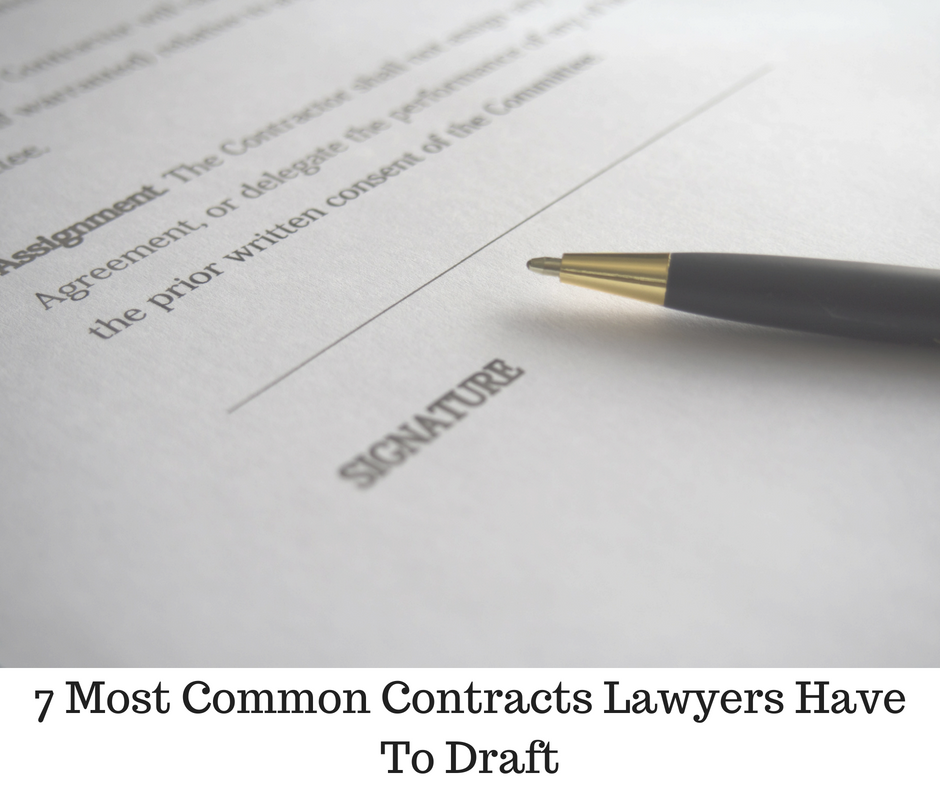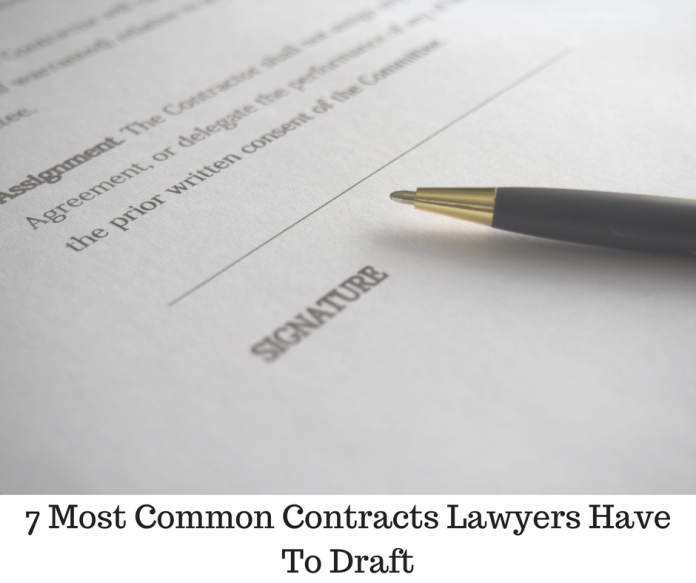 What are the common contracts a lawyer must draft?
What are the common contracts a lawyer must draft?
We all know that drafting is quintessential aspect of every lawyer’s skill sets. They must learn how to draft petitions, applications, notices, etc. But contract drafting is often attributed to the skills of lawyers at law firms or in-house counsels.
All lawyers must learn how to draft contracts, early in their career. It not only helps in increasing your clientele, it helps you supplement your income as well as lead to better prospects. Read this article, to know why young advocates must learn how to draft contracts.
So while you learn and earn, many times you will get all sorts of clients with different requirements. You may need to advise on employment issues, or, tenancy issues, etc. In order to do that, you must be familiar with the contracts of different nature. To be able to interpret contracts is only one aspect, you must be able to create one as well.
There are several kinds of contracts depending upon your area of expertise like commercial contracts, general contracts, intellectual property contracts, technology contracts, e-commerce contracts, etc. These require specialised knowledge of contract drafting which can be inculcated by doing a contract drafting course.
The common contracts a lawyer may need to draft are as follows:
-
Confidentiality and Non-Disclosure Agreement/ Non-Circumvention
NDAs are generally signed when two companies, individuals, or other entities (such as partnerships, societies, etc.) are considering doing business. The idea is that they need to understand the processes used in each other’s business for the purpose of evaluating the potential business relationship. But so that one doesn’t use the information so shared for the detriment of the other party.
NDAs can be mutual as well as for single party use. For instance, and employee may be asked to sign an NDA with his employer. In fact, some employment agreements will include a clause restricting employees’ use and dissemination of company-owned confidential information. Sometimes, there are confidentiality agreements signed whenever there is settlement of legal dispute between the parties.
You can refer a sample NDA here.
-
Memorandum of Understanding
A memorandum of understanding (MoU) is a type of agreement between two (bilateral) or more (multilateral) parties. It expresses a convergence of will between the parties, indicating an intended common line of action. It is often used in cases where parties either do not imply a legal commitment or in situations where the parties cannot create a legally enforceable agreement. It becomes binding only when the essentials of contract is added to it, like offer, acceptance, consideration, intention, etc.
You can download a sample of MoU from here.
-
Leave and License Agreement
One of the most common agreements is the leave and license agreement. It is an instrument/agreement wherein the licensor allows the licensee to temporarily occupy and use one portion of an immovable property for carrying on his business for residential purposes.
The licensor grants the leave and license to the licensee for a minimum period of 11 months and for this, in lieu of license fee/rent money. This agreement has to be mandatorily registered before the sub-registrar of assurances at the place of jurisdiction where the property is located.
Generally, in case of letting out spaces for rent for residential or business purpose, owners enter into such an agreement with the prospective party. In most cities, for short term period such agreements are entered into and renewed as needed.
You can refer to the sample of the agreement here.
-
Lease Deed
The legal definition of a lease is provided for under Section 105 of the Transfer of Property Act. A lease is a transfer of a right to enjoy a property made for a certain time in exchange for an amount of money or a service or any other thing of value to be given periodically such as price paid or promised or of money, a share of crop, service or any other thing of value to be rendered periodically or on specific occasion to the Lessor by the Lessee who accepts the transfer on such terms.
Lease gives the lessee right of possession for a longer duration for a lump sum payment or monthly rental fees. For instance X leases a property from Y, in lieu of a specific consideration. Then X becomes the lessee and Y is the lessor. They are both bound by the rights and obligations laid out in the lease deed.
You can learn how to draft a lease deed by reading more about it. You can refer the sample agreement here.
-
Partnership Agreement
In case of an enterprise for profit between two or more people, a partnership agreement may be entered into. The agreement defines the nature of the business, the capital contributed by each party, the rights and obligations of parties, the share of profit/loss of each party, etc.
In a partnership, the partners are liable jointly and severally for all profit/loss, unlike in any other setup. For instance, if the debt incurred is more than the resources at the business, then as per the terms of the agreement, partners will be personally liable for the same. Their personal properties can be attached by the courts for the repayment of such debts.
The registration of a partnership deed in India is not mandatory, unless the firm is being registered.
You can refer to the sample here.
-
Employment Agreement
An employment contract or is signed between an employer/ company and an employee. The employment agreement contains specific provisions like joining date, office location,etc., to the terms and conditions of the employment, like compensation, holidays, working hours, etc. The rights and obligations of the employee are also laid down in form of terms and conditions to which the employee is legally bound upon signing the agreement.
For instance, if an employee’s work invents a product during his tenure with the company, then the company may own it, provided it is clearly mentioned in the employment agreement.
You may refer to the sample agreement here.
-
Contract of Sale
Section 4(1) of the Sale of Goods Act, defines the contract of the sale as follows-
“A contract of the sale of goods is a contract whereby the seller transfers or agrees to transfer the property in goods to a buyer for a price.”
The contract of sale specifies the nature of the transaction, description of goods, mode of delivery of goods, mode of payments, rights and obligations, warranties by the parties, termination, etc. For instance, A has entered into contract of sale with B, for the sale of 10,000 units of books in lieu of payment through NEFT mode of payment. Now as per the terms of the agreement, the payment cannot be made by cash or cheque, or it can be ascertained to be a breach of contract.
To know more about the essential clauses in a contract of sale and its sample, you can refer to this article here.
The clients for the common contracts are both easy to come by to the lawyers and good for their practice. The benefits of contract drafting for lawyers is immense. It can help supplement their incomes to increase their clientele and knowledge of law. There is a necessity for the lawyers to learn contract drafting. They can work with law firms, or in-house legal departments to learn the same or they can do contract drafting course. The idea is to learn to draft the contracts at the early stages of their practice to gain the maximum out of it.
Good luck
 Serato DJ Crack 2025Serato DJ PRO Crack
Serato DJ Crack 2025Serato DJ PRO Crack









 Allow notifications
Allow notifications


